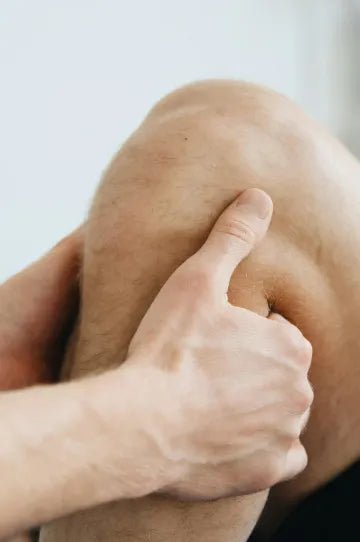




What are you looking for?

Ayurvedic medicine for knee pain can support stiffness, swelling and everyday movement. Learn safe herbs, home tips and when to see a doctor.
Knees work hard every day. When pain or stiffness shows up, even simple tasks feel heavy. Ayurvedic medicine for knee pain focuses on calming aggravated Vata, reducing “ama” (toxin-like build-up), and supporting cartilage and muscles with herbs, oils, and routine. Below is a simple, safe way to start at home—and to know when you should see a doctor.
It is a holistic plan that uses herbs, warm oil massage, gentle movement, and food habits to rebalance the body. Instead of chasing only pain, Ayurveda looks at digestion, sleep, daily activity, and stress—because all of these can worsen knee trouble.

“Best” depends on your cause and body type. Common, time-tested options:
Tip: Start low, go slow. Combine herbs with routine (oil massage, food, sleep). If you take prescription BP/sugar/thyroid meds, speak with your doctor first.
Focus on Vata-calming: warm oil massage, gentle daily range-of-motion, Shallaki or Guggul, turmeric with meals, and steady sleep. See your doctor if there’s sudden swelling, locking, or night pain.
Alternate rest and light movement. Try warm sesame oil rub, ginger-turmeric tea, and short mobility drills. Avoid long sitting without breaks.
Support hormones, reduce salt and packaged foods near your periods, and use warm compresses. If cramps/stiffness are a pattern, a cycle-support formula may help.

Ayurvedic herbs are generally well-tolerated, but strong formulas can interact with medicines. If you’re pregnant, have kidney/liver disease, or severe arthritis changes on X-ray, get individual guidance before starting.
Amiy’s doctor-formulated blends use Bio-Neuromodulation™ (helping nerve communication balance) and Complex Plant Elixir™ (synergistic botanicals) to support comfort and recovery—without harsh additives.
Ayurvedic Treatment for Back Pain: Simple Steps That Help
Buy Ayurvedic Treatment for Allergic Rhinitis
Educational note: Osteoarthritis is a leading cause of knee pain worldwide. Learn about red flags and care options on the WHO site. (WHO link in references)
This content is for education only and is not a substitute for professional medical advice. Please consult a qualified healthcare provider for personal care.
There’s no single “best” for everyone. Many people use Shallaki (Boswellia), Guggul, turmeric with pepper, and warm oil massage. Match herbs to your cause (Vata stiffness, swelling, overuse). Start low, go slow, and check with your doctor if you take other medicines.
Mild stiffness may ease in 1–3 weeks with daily routine. Long-standing osteoarthritis needs consistent care for 8–12 weeks or more. Movement, digestion, sleep, and stress control speed results.
Mahanarayan taila is popular. At home, warm sesame oil also helps. Massage gently for 5–10 minutes, then apply a warm towel. Avoid on broken skin or if there’s acute, hot swelling.
Ayurveda supports pain, swelling, and recovery routines, but structural tears need medical assessment. Get a physical exam (and imaging if advised). Use Ayurvedic care as supportive, not a replacement.
Often yes, but some herbs can interact. Share your supplement list with your doctor, and monitor sugars/BP when starting new herbs.
If you want an easy, doctor-formulated start, try Muscle Mercy. It blends joint-support herbs in balanced ratios and fits well with warm oil massage and gentle mobility.
If heaviness or bloating worsens aches, Gut Reset may support digestion and reduce ama-like build-up. Our approach uses Bio-Neuromodulation™ and Complex Plant Elixir™ to support comfort naturally.
You can also search for: Ayurvedic Medicine For Acidity And Gas | Ayurvedic Medicine For Acidity Safe Gas Relief | Ayurvedic Medicine For Allergy Relief Simple Steps | Ayurvedic Medicine For Anxiety And Stress Calm The Mind Sleep Better | Ayurvedic Medicine For Cholesterol Natural Control Guide | Ayurvedic Medicine For Constipation | Ayurvedic Medicine For Constipation Simple Relief | Ayurvedic Medicine For Dry Cough Natural Relief By Amiy Naturals | Ayurvedic Medicine For Headache Gentle Lasting Relief | Ayurvedic Medicine For Hormonal Imbalance Women S Guide | Ayurvedic Medicine For Hormonal Imbalance Women S Guide 1 | Ayurvedic Medicine For Inflammation And Pain Natural Relief | Ayurvedic Medicine For Irregular Periods Gentle Relief Balance | Ayurvedic Medicine For Joint Muscle Pain Simple Relief | Ayurvedic Medicine For Nerve Pain Natural Relief Guide | Ayurvedic Medicine For Pimples Clear Skin Naturally | Ayurvedic Medicine For Sleep Gentle Ways To Rest | Ayurvedic Medicine For Stomach Pain Gentle Relief | Ayurvedic Medicine For Weight Gain Safe Natural Ways | Ayurvedic Medicine Joint Muscle Pain | Ayurvedic Medicine Simple Guide To Natural Healing | Ayurvedic Solution For Stress Anxiety Amiy Naturals | Ayurvedic Syrup For Irregular Periods Gentle Cycle Support | Best Ayurvedic Health Supplements Amiy Naturals Online | Best Ayurvedic Medicine For Acidity And Gas | Best Ayurvedic Medicine For Blood Circulation Amiy Muscle Mercy 1 | Best Ayurvedic Medicine For Body Pain And Weakness Natural Relief | Best Ayurvedic Medicine For Gastric Problem Simple Relief | Best Ayurvedic Medicine For Insomnia Anxiety Amiy Naturals | Best Ayurvedic Medicine For Insomnia Anxiety Amiy Naturals 1 | Best Ayurvedic Medicine For Insomnia Sleep Drops By Amiy | Best Ayurvedic Medicine For Memory And Concentration | Best Ayurvedic Medicine For Migraine Gentle Relief | Best Ayurvedic Medicine For Neurological | Best Ayurvedic Medicine For Painful Menstruation Amiy Naturals | Best Ayurvedic Medicine For Sinus Allergy Relief | Best Ayurvedic Medicine For Skin Diseases Amiy Naturals | Best Ayurvedic Medicine For Snoring Problems Natural Relief | Best Ayurvedic Medicine For Stamina Energy | Best Ayurvedic Medicine For Stomach Cleansing Drops | Best Ayurvedic Medicine For Stomach Problems | Best Ayurvedic Medicine For Varicose Veins Relief | Best Ayurvedic Medicine For Women S Health Amiy Naturals Drops | Best Ayurvedic Medicine For Women S Health Amiy Naturals Drops 1 | Best Ayurvedic Oil For Muscle Pain Relief Safe Natural Support | Best Ayurvedic Products For Skin Herbal Medicine Onlin 1 | Best Ayurvedic Skin Care Products Clear Calm Glowing | Best Ayurvedic Skin Care Products Simple Picks For Clear Calm Skin | Best Ayurvedic Syrup For Glowing Clear Skin Amiy Naturals | Best Medicine For Nerve Pain In Neck Ayurvedic Guide | Buy Ashwagandha Ayurveda Drops Stress Relief Energy Boost | Buy Ayurvedic Blood Purifier Natural Herbal Drops For Healthy Blood | Buy Best Ayurvedic Medicine For Memory Concentration Amiy Naturals | Buy Best Ayurvedic Tonic For Glowing Skin Amiy Naturals | Top 10 Ayurvedic Herbs For Daily Use | Weight Loss Ayurvedic Medicine Safe Options For Women
